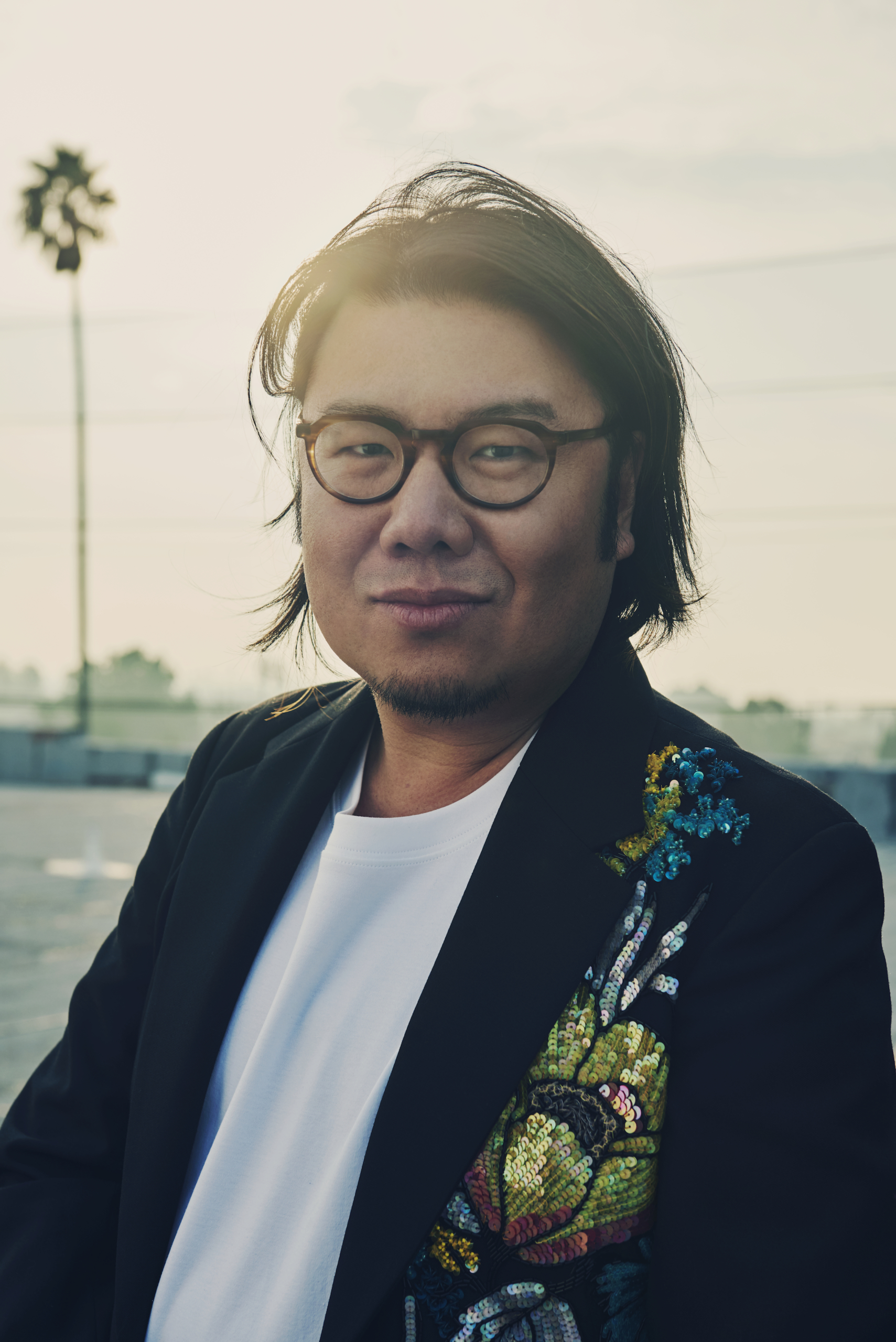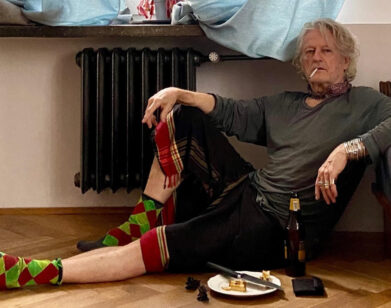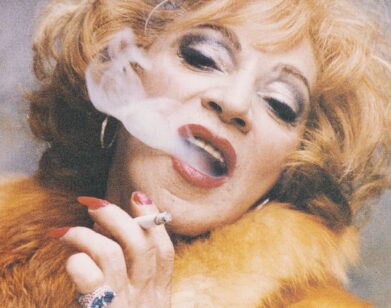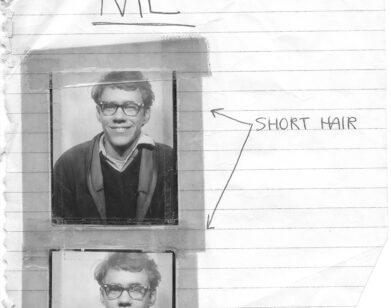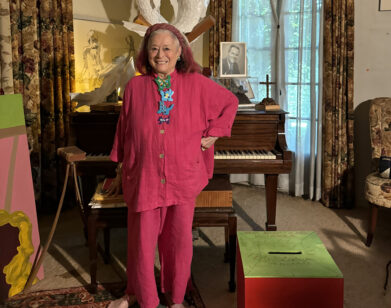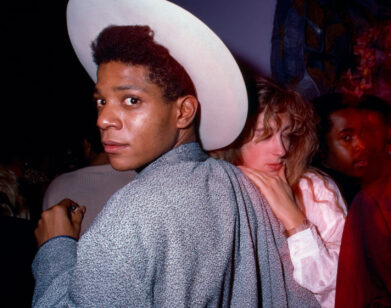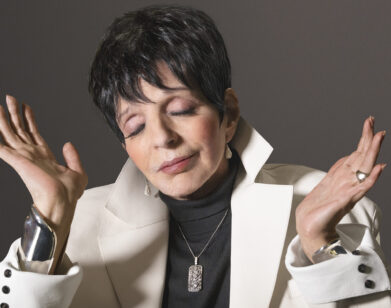Kevin Kwan and Cornelia Guest ShareStories About the Crazy Rich and Famous
Kevin Kwan has dedicated his fourth novel, Sex and Vanity, to two unique destinations. One is New York, the city that the writer moved to after college in the mid-1990s (early on, he even worked as an Interview intern). The other is the Italian island of Capri, the Amalfi Coast idyll to which Kwan regularly escapes for summer holidays. Both locales—rich, glamorous, and filled with their share of both insiders and outsiders looking for their ticket in—serve as backdrops for Kwan’s latest ode to love, class, and the problematic, hilarious search for happiness in a world spinning with too much of pretty much everything. Kwan, author of the wildly popular 2013 novel Crazy Rich Asians, is an urban romantic and he’s also a keen observer of social mores and the Teflon charms of an offbeat character. Sex and Vanity is sharp, clever, and irresistibly drawn as it follows Lucie Tang Churchill from a fling at a friend’s Capri wedding to glittery Fifth Avenue as the protagonist tries to fulfill the expectations of a wealthy, young, half-Chinese, half-old-school-WASP New Yorker. It’s never so easy, of course, to will your heart to obey your social position as Kwan’s model once took pains to remind us (the book is an homage to E.M. Forster’s A Room with a View). Among the many recognizable names populating Sex and Vanity is the actress and Manhattan blueblood Cornelia Guest. In one scene, Lucie approaches Guest at a party to ask her about posing topless for Andy Warhol. In real life, Guest and Kwan are good friends, and they chatted on the eve of Sex and Vanity’s release about hiking Capri and hanging out with Warhol.
———
KEVIN KWAN: I was about to text you a photograph of the first issue of Interview that has my name on the masthead under intern. It’s the September 1996 issue with Goldie Hawn on the cover.
CORNELIA GUEST: Oh, wow.
KWAN: And on the spread, which I think is just so cosmic, is a huge ad for Basquiat, the movie. There’s a big picture of Jeffrey Wright playing Basquiat holding what looks like a Big Bird doll. So it’s come full circle. I started my life in New York interning at Interview and here we are today. It’s so special.
GUEST: I spent so much of my childhood down at Interview when I was little. I used to go sit under Fred Hughes’s desk at the office, and I would watch Andy paint. But actually, this is my first time interviewing someone for the magazine. I’m glad to be doing it for your amazing book, Sex and Vanity. I remember with Crazy Rich Asians, I just wanted to be there, I wanted to go with these characters. And the same goes for hanging out with you—I always want to go where you’re going because you have an unbelievable way of absorbing things and spinning it and making it even better. I can’t wait to go to Capri with you one day.
KWAN: Can we please do that? Whose yacht could we borrow?
GUEST: When did you start your love affair with Capri?
KWAN: It began around the same time as my love affair with A Room with a View, which this book is an homage to. I was probably around 15 or 16 when I read A Room with a View, saw the movie, and totally flipped about Italy. Later that summer, I begged my parents, “Let’s go to Italy,” and we did. We spent a month there, and I went to Capri for the first time. Unfortunately, we were kind of innocents abroad and we did what most everyone does. They do a day trip to Capri, which is really the worst way to see the place. The town becomes filled with 50,000 tourists from 10 a.m. to 5 p.m. And the locals, all the glamorous people, all the amazing Capresi, they hide.
GUEST: They run like hell!
KWAN: They’re at beach clubs or in their homes. Or nursing their hangovers. It’s just a complete tourist city. It’s still beautiful, but you don’t really get a sense of the magic of the place. That really only happens after 5 p.m. when the last ferry boat leaves and the people start coming out and everyone’s just glowing and beautiful and glamorous! That first visit I was only able to be there for that one day, but I went back three years later, and I’ve been going back almost every summer since. It’s my escape.
GUEST: You describe it like a historian, with your love of its many intricacies.
KWAN: Capri has been a jet-set playground since 50 A.D. when the emperor of the Roman Empire moved the capitol there and built a house. Jet-setters have been going there ever since. You’ve been there a couple of times, haven’t you?
GUEST: Oh yes, it’s magical—and all the lemons! I love that you can walk around in sandals and everyone at night is dressed up and happy because they’ve all had such a beautiful day in the sun. The food is so delicious. It smells divine. There’s no place like it in the world. And there’s that photographer there who takes pictures of everyone all dressed up.
KWAN: That paparazzo never takes a picture of me, which is great. I mean, it’s not like L.A. and being TMZ’d at the airport. It can be a lovely place where I can just hide.
GUEST: Well, after Crazy Rich Asians, come on. That was a worldwide phenomenon. So you can’t tell me that no one recognizes you.
KWAN: Maybe if I go with you, I’ll get my picture taken.
GUEST: What’s your favorite place to go in Capri?
KWAN: I just wander around in the hills. There are so many amazing hiking trails. I’m a big hiker, actually. I would not recommend it unless you’ve had some hiking experience, though, because the first time I did it, I almost died. And there’s a secret trail that connects Capri to Anacapri. I did it in reverse and you’re basically climbing down a mountain in sandals and I had stupidly gone shopping in Anacapri before that. I had shopping bags with me and there I was on the edge of a cliff and there was no going back once I started. No one told us it was a real, Patagonia-grade hike.
GUEST: Death-defying.
KWAN: The amazing thing is, once you’ve finished this hike, you’re in the middle of absolute nature. You feel like there’s no one on the island and then once you finally survive the descent and make it down and walk down a path, suddenly you’re in the main square. You’re in the main piazzetta and you can sit down and have a civilized Aperol Spritz or lemon granita, and that’s what I did. I had beautiful, icy, lemon slush.
GUEST: Have you ever done that hike in Positano? Path of the Gods? They told me it was a couple of steps. Two hours later, I was at the top of 5,000 steps. And then, literally, you have to go back down.
KWAN: Every time I go to Italy, I lose weight. It’s the best workout for me because the food is so fresh and I’m so much more physical than I normally am in my usual, sedentary writer’s life.
GUEST: Who were the writers that inspired you when you were growing up?
KWAN: I was really inspired by that New York School of Writers. I grew up in Singapore until I was 11 and then my dad forcibly removed me and planted me in the middle of Texas. I hated it.
GUEST: That’s a big switch.
KWAN: It really, truly was because Singapore was cosmopolitan. It was like New York—diverse and international. And I went from that to suburban Texas. I was really depressed.
GUEST: That can be so hard for a kid.
KWAN: I love Houston, but for a kid in the suburbs in the mid-’80s, being Chinese, being Singaporean, I had to sink or swim. That first Thanksgiving, my mom took me to New York just to cheer me up. The minute I got there, just walking down Fifth Avenue, I was like, “Okay, this is it. This is where I want to be.” I actually went to the Doubleday bookstore, which is another full circle due to my amazing publisher.
GUEST: That bookstore was so beautiful.
KWAN: Wasn’t it, though? It was right on Fifth and 58th. Anyway, I thought, “I have to get back to New York.” So it took me 10 years to get out of Texas. But in the meantime, I was subscribing to Interview, getting as much of New York as I could, preparing. So Interview, believe it or not, was really my gateway into downtown New York and getting a feel for the city. And then I was reading Tom Wolfe’s Bonfire of the Vanities, Tama Janowitz’s Slaves of New York, and, of course, Dominick Dunne’s People Like Us, which, to me, was one of the ultimate chronicles of the New York that you know very well. There’s a rumor that one of the characters in People Like Us was based on your mom, C. Z. Guest.
GUEST: Oh, wow. I never heard that. But I loved Dominick and he became a great friend of mine. During the O.J. [Simpson] trial, I would see him all the time because I was out in Los Angeles and we would get together and have lunch or dinner. He was just fascinating to listen to. He had a great brain. I love his books, but I think you take it one step further and create these magical settings.
KWAN: You’re very generous. Thank you.
GUEST: I’m not generous. I’m very truthful. He goes a different way.
KWAN: He goes dark because he’s exposing murders. His life was all about a fight for justice after losing his daughter to a murderer. So all the books after that—The Two Mrs. Grenvilles, A Season in Purgatory, and An Inconvenient Woman—look at murderers. People Like Us was really, in a way, murder by social suicide. The people in that book are vicious. He really put a vicious lens on New York, but it was also so funny. I’ve satirized people, but it comes from a place of love. I don’t want to take anyone down. I’m not being malicious.
GUEST: I sense everything you write comes from a place of love.
KWAN: Sex and Vanity is really my love letter to New York because once I moved here, it really nurtured me. I was a little, suburban Asian kid and for some reason New York opened its doors to me, the cool people downtown opened up their lives to me—even the people uptown, the Upper East Side crowd, which I very gently and lovingly satirize in the book.
GUEST: You satirize them so beautifully. They should be thrilled. It’s a love letter to all of them, but, you know, that’s what I think is so special about New York—it is so open and it just envelops you and keeps you warm and safe. In that safety, you can fly. I don’t know any other city in the world that does that. And the nightclubs, the people, where you would go for lunch—everything—the little nooks and crannies of the city.
KWAN: How did Andy [Warhol] inspire you? You were very good friends with him, weren’t you?
GUEST: I was. He came to my parents’ house for dinner and I was about 5 or 6 years old. I had these Jack Russell puppies and Andy loved dogs. So he wanted to come upstairs and see these puppies. I guess I was up there coloring and he stayed upstairs and he helped me color. My mother sent someone up and said, “Mr. Warhol, dinner is ready.” And he said, “Okay, I’ll be there in a minute.” This happened three or four times. Finally my mother came up and was like, “Andy, you need to come down for dinner.” And he said, “Couldn’t I have my plate up here with Cornelia?” Of course she threw a fit. She was like, “No, you cannot. You’re here to see me.” And we became great friends. I used to go to The Factory all the time.
KWAN: Jean-Michel [Basquiat] and you were in the mix of things, right? You were probably a precocious teenager, weren’t you?
GUEST: Yeah, exactly. I was a preteen and Fred Hughes and Andy, they were so much fun. Andy loved coming to horse shows to watch me ride. He was just interested in everything. And I guess that he really showed me how to be interested in everything and everyone and talk to people. There are little gems everywhere, where you least expect it.
KWAN: That’s one thing I’ve noticed hanging out with you. You can really talk to everyone. A lot of people only talk to their own tribe, and that’s sad because you miss out. I’ve always been that way, too. I never thought about how old anyone was or what color their skin was or what they did or whether they had a title in front of their name.
GUEST: Everyone’s story is so different and no one is ever who you expect.
KWAN: What do you make of the WASP establishment? Do you think it’s an endangered species? I know that’s a loaded question because people who don’t know you could say that you epitomize that world.
GUEST: I think there are so many different enclaves of the WASPs, if that’s what you want to call them, and they’re all so different. I don’t take any of this seriously and nor do you. There’s no place for self-entitlement. And sometimes the WASP-y world can get very self-entitled and that’s not a good thing.
KWAN: I think that’s true in any elite circle. Whether it’s WASPs from the East Coast or the old-money Singaporeans. I mean, that’s what I found that was interesting when I was writing my book, in that the habits, the mentality, what they value, it’s all the same in a way. I think you can draw a correlation between old, WASP society, old English aristocracy, and old Asian money. They kind of share the same values. They all have wicker.
GUEST: I think it’s the new ones that are messing it up. They really need to look and study the elders because that’s where the elegance comes from. It’s the fourth generation and the fifth-generation destroying stuff.
KWAN: They say it’s gone by the third generation. The first generation makes it, the second generation stems it, and the third generation loses it.
GUEST: It’s easy to forget that the United States is such a young country. Compared to the British aristocracy. I mean, how long has Capri been there? I always love going to places in Europe and thinking, “My feet are walking in the same path where Nero was.”
KWAN: Talk about the ancient families of Rome—so many of them are still around. The descendants are still around! I think you know a lot of these families. I think you and I were both put in great situations as children for observing people. I didn’t have Andy Warhol coming over to my house for dinner, but I lived with my grandparents growing up and they always had the most fascinating people over for dinner. My aunt would bring a lot of people from creative circles over to the house. From a young age, I was always observing characters. And we’d have these really strange characters over and 20 or 30 years later I realize, “Oh my god, that was so and so, the famous Shanghainese artist or Edwina, the Countess of Mountbatten, who came for tea.” I had no idea.
GUEST: I have a funny story about Edwina. Someone told me a few weeks ago that my dad had a thing with her before she was married. Apparently she was crazy about my father, and he was a great friend of Mountbatten’s.
KWAN: It’s such a small world. She was a libertine, as we know, right? She was in Singapore a few times because she was the patroness of the St. John’s Ambulance, the charity. And my grandfather was the commissioner of St. John’s Ambulance Brigade in Singapore. They had her over to tea and my grandmother apparently refused to come downstairs to meet her.
GUEST: I love it.
KWAN: My grandmother was in her own category of snobbery. To turn the tables, she felt like the Anglos were beneath her. So she was like, “I’m not coming down. Go entertain this work staffer, this work friend, if you want.”
GUEST: How wonderful. You must have had so much fun with your grandmother.
KWAN: She didn’t suffer fools and she also didn’t have much tolerance for children. She was very much into her own world. She cultivated orchids and all these different exotic fruits. My memory of her was always that she was on top of a wooden ladder at age 85. She would climb to the top of these guava trees and she would wrap each of them individually.
GUEST: Did you like to eat them?
KWAN: I didn’t like guava, to be quite honest. I love rambutans and starfruit. We had so many different tropical trees at our house and she lovingly wrapped each one of them. That was her thing. She had her little, internal world, but every now and then, she would talk to me and she would share these stories about what it was like during the war and just a lot of it would be complaints against my parents. “Learn the lesson, kid, because your parents didn’t.” I soaked it all up. She was a pretty amazing woman in her own right and super stylish, like your mom.
GUEST: My parents were much older when they had me, so I didn’t know any of my grandparents. But I had older godparents and friends of my parents who would tell me stories about Newport at the turn of the century and those amazing old houses. I imagine there are also beautiful houses in Singapore, the kind in Crazy Rich Asians.
KWAN: The old, black-and-white colonial houses. There’s nothing else like them in the rest of the world. They were built by British architects trying to deal with the heat and the humidity, like, “how do we survive on this island? How do we bring our women here?” They built these beautiful houses and the British women came and they created their own little British society within Singapore, and they’d have their tea parties. And it’s just amazing to see how they also mixed with the Chinese. My great aunt hosted a beautiful tea party at our house and I have photos of the little children’s tables where you see all these little kids low down to the ground and then there’s all these other tables where the adults were sitting in beautiful floral cloths. And then there’s this random British lady in sunglasses looking very mysterious sitting there next to an old, Chinese amah who looked like she stepped out of the 17th century. It’s just amazing. That was the world I was trying to evoke.
GUEST: And you’ve done a great job. What’s next?
KWAN: This is the start of a new trilogy called the Cities Trilogy. The story of Lucy is done. I’ve told her story. So the next book is my homage to London. And the third book will be Paris. That’s the set up. These will have new stories with new heroes and heroines all centered on that city. London is another place I feel very close to.
GUEST: Well, when you do your research, I’m coming with you.

